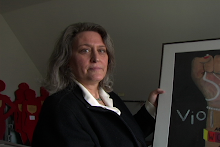Earlier this week Peter visited my class on domestic violence at Monroe College. The students had already seen Power and Control; and since we are currently studying DV policing we watched the P&C law enforcement training film.
Participation in the Q&A which followed the screening was excellent.
I have observed that the complex aspects of the issue and the complex appropriate interventions are made clear and memorable in P&C. Because the film(s) express practical, coordinated responses and the underlying social and political issues very clearly students respond on these different levels clearly. I am convinced that this multiple focus is imperative to really meaningfully approach DV education and film supports this approach.
Anne Paulle
Thursday, September 30, 2010
Wednesday, September 29, 2010
A wonderful meeting in Manhattan
Once again, I'm impressed, moved and inspired by the people who spend every day of their lives working to stop domestic violence.
As a relative newcomer to his field (only two years in), I can remember my first fears that everyone involved would be a doctrinaire feminist. I still feel slightly out of place at meetings of domestic violence groups when I look around the room and see that I'm one of the few men around, but I've basically gotten used to that.
Yesterday's presentation to the Manhattan Borough President's Domestic Violence Task Force was another one of those inspiring, affirming moments.
After everyone watched about 20 minutes of our domestic violence film "Power and Control," the conversation turned to the big question of "where do we go from here?"
The excerpts I chose to show yesterday focused on the Duluth Model, and on Ellen Pence and Michael Paymar, co-creators of the Model. Just as I've found that Ellen and Michael are not close minded ideologues holding onto their nostalgia for early 1980s ideas, many of the advocates discussing the film yesterday showed a strong interest in moving forward in search of new paradigms.
For example, one advocate from a major New York advocacy group spoke of how her organization is seeking a fundamentally new approach, a "client-centered" model. That model does not exclusively focus on pressing victims to leave their abusers, but keeps in mind that some clients may want to "stay," and that advocates should respect that choice when it's made for good reasons.
Another advocate at Centre Street, an official from a major NYC social services agency, talked about how her organization is moving more toward having everyone at the table, including the abuser.
And another advocate eloquently and passionately spoke about batterer intervention programs, and how the Duluth Approach, which has defined these programs for several decades, can be respected, and retain its influence, while at the same time practitioners can explore new models for changing batterer behavior.
Now we're not talking about a Mens' Rights meeting here, folks. But we are talking about an impressive group of activists, determined to keep this cause moving forward.
As a relative newcomer to his field (only two years in), I can remember my first fears that everyone involved would be a doctrinaire feminist. I still feel slightly out of place at meetings of domestic violence groups when I look around the room and see that I'm one of the few men around, but I've basically gotten used to that.
Yesterday's presentation to the Manhattan Borough President's Domestic Violence Task Force was another one of those inspiring, affirming moments.
After everyone watched about 20 minutes of our domestic violence film "Power and Control," the conversation turned to the big question of "where do we go from here?"
The excerpts I chose to show yesterday focused on the Duluth Model, and on Ellen Pence and Michael Paymar, co-creators of the Model. Just as I've found that Ellen and Michael are not close minded ideologues holding onto their nostalgia for early 1980s ideas, many of the advocates discussing the film yesterday showed a strong interest in moving forward in search of new paradigms.
For example, one advocate from a major New York advocacy group spoke of how her organization is seeking a fundamentally new approach, a "client-centered" model. That model does not exclusively focus on pressing victims to leave their abusers, but keeps in mind that some clients may want to "stay," and that advocates should respect that choice when it's made for good reasons.
Another advocate at Centre Street, an official from a major NYC social services agency, talked about how her organization is moving more toward having everyone at the table, including the abuser.
And another advocate eloquently and passionately spoke about batterer intervention programs, and how the Duluth Approach, which has defined these programs for several decades, can be respected, and retain its influence, while at the same time practitioners can explore new models for changing batterer behavior.
Now we're not talking about a Mens' Rights meeting here, folks. But we are talking about an impressive group of activists, determined to keep this cause moving forward.
Wednesday, September 22, 2010
The Launch: Part Two
A lot going on with the film:
-- Reviews are in. We've now been reviewed by most of the key trade publications in the world of libraries: Educational Media Reviews Online ("highly recommended"), Video Librarian (*** recommended) and Booklist. These strong reviews follow our good notices at the Minneapolis St. Paul International Film Festival. All reviews are posted here.
-- Some interesting outreach events coming up. Next week, I'll be showing excerpts of the film to the Manhattan Borough President's Domestic Violence Task Force. I'm looking forward to this one. I'm hoping to catch up with New York City domestic violence advocates I came to know while researching the film. Perhaps watching a film that was shot in Duluth, MN by a native New Yorker will warm them up to allowing the next documentary film maker who approaches them to film in some of their facilities.
-- Then in mid-October, a trip to Maryland to screen the film at Prince George's Hospital Center (near DC) as a kick-off event to launch their new domestic violence program.
-- We are talking to a number of groups about using the film during domestic violence awareness month. I'm also hoping that our brilliant widget, with 12 answers to the question of "Why don't they just leave," gets the massive viral circulation that it deserves during the month. See widget at right (it may be a bit scrunched, but you can still click "share")
-- Reviews are in. We've now been reviewed by most of the key trade publications in the world of libraries: Educational Media Reviews Online ("highly recommended"), Video Librarian (*** recommended) and Booklist. These strong reviews follow our good notices at the Minneapolis St. Paul International Film Festival. All reviews are posted here.
-- Some interesting outreach events coming up. Next week, I'll be showing excerpts of the film to the Manhattan Borough President's Domestic Violence Task Force. I'm looking forward to this one. I'm hoping to catch up with New York City domestic violence advocates I came to know while researching the film. Perhaps watching a film that was shot in Duluth, MN by a native New Yorker will warm them up to allowing the next documentary film maker who approaches them to film in some of their facilities.
-- Then in mid-October, a trip to Maryland to screen the film at Prince George's Hospital Center (near DC) as a kick-off event to launch their new domestic violence program.
-- We are talking to a number of groups about using the film during domestic violence awareness month. I'm also hoping that our brilliant widget, with 12 answers to the question of "Why don't they just leave," gets the massive viral circulation that it deserves during the month. See widget at right (it may be a bit scrunched, but you can still click "share")
Subscribe to:
Comments (Atom)







